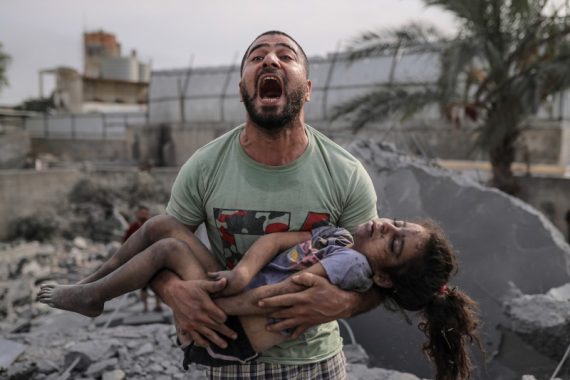T
he “Jewish problem,” which the Western world defined as such and has made efforts to resolve up to a century ago, was thrown into the Islamic world as a bomb with a Zionist-Evangelical alliance. Due to the chaos caused by World War I in the Islamic world and the instability that emerged after the Ottoman Empire was forced to withdraw from the Arab world, Jewish invaders, who were encouraged by the West to migrate by force, began to settle in Palestine under the auspices of Britain. The Palestinian territories and the geography of Jerusalem were occupied over time as a result of raids on villages and towns by Jewish terrorist organizations, and this de facto situation gave birth to “Israel” in 1948.
The “Jewish problem” of the Western world became the “Israel problem” of the Islamic world, and Palestine turned into an all-out cause. On its 75th anniversary, this occupying power, which still acts with the reflex of an organization and tries to destabilize the region and feed on the violence and chaos it causes, has been condemned and isolated by the world’s collective conscience following the recent massacres it has perpetrated. Palestinians, on the other hand, have succeeded in turning their cause into humanity’s common cause by passing the flag of resistance against this century-old policy of occupation, plunder, and usurpation from generation to generation. In the face of the disproportionate attacks and massacres they suffered after the raid on the occupation outpost in the Gaza envelope on October 7, 2023, the Palestinians have given their struggle for freedom a global dimension.
Operation Al-Aqsa Flood started as a reaction to the silent death of Gaza for the last two decades, but has also led to regional mobilization and change. Faced with the threat of expulsion from their land, the Palestinians did not leave their homeland in the face of the bombardment, exposing the “de-Palestinization of Palestine” project that has been talked about in the occupation circles for decades. In fact, this plan is a continuation of the policy of occupying the land and expelling its inhabitants, which has been practiced since 1948.
Today, 70% of Gaza’s population is made up of Palestinians who have been expelled from their land over the last 75 years; in other words, people who have been forced to become refugees in their own homeland. The people of Gaza, who have been subjected to ethnic cleansing by Israel for its own survival and to obtain a Jewish-majority territorial integrity, did not leave their land of refuge, this time at the risk of death.
Read: Nakba 2023 in Gaza
The Abraham Accords (Safqat al-Qarn/The “Deal of the Century”)
With the Arab revolutions that started in Tunisia in 2011 and spread across the Arab world, particularly in Egypt, Libya, Syria, and Yemen, the Palestinian issue took a back seat. Peaceful street demonstrations, which started with demands for freedom, justice, and dignity, eventually turned into civil wars in some countries, and nearly ten times the number of people who were massacred in the Palestinian territories over the course of the century lost their lives. In short, Baghdad, Damascus, Aleppo, and Yemen cannot be compared to any Palestinian city in terms of humanitarian catastrophe.
One of the two axes that emerged with the Arab revolutions was in favor of maintaining the status quo, and Israel cooperated with this axis and increased its pressure on Palestine. However, since it perceived the mass demands for change and transformation in the region as a long-term threat, it pursued a policy of rapid normalization with the Arab regimes in the region. Some Gulf monarchies, perceiving the demands emerging with the Arab revolutions as a threat, accelerated their normalization policy by aligning with Israel. The Abraham Accords, announced by then U.S. president Donald Trump at a ceremony attended by Saudi Arabia, the UAE, Bahrain, Jordan and Egypt, were proclaimed to be the “Peace of the Century.”
In fact, the accords were an acknowledgment that Israel was a source of regional unrest and in perpetual violation of regional peace. These initiatives, which it should be noted did not involve Palestinian actors, envisaged numerous economic, political, and cultural activities, such as the flooding of economic aid to the region; support for the governments of Jordan, Lebanon, and Egypt; the establishment of investment zones in Sinai where Gazans would work; and the construction of a high-speed railway between Gaza and the West Bank. As part of these cultural activities, a Jewish group organized joint events with certain Gulf countries which expressed the universal peace messages of the three Abrahamic religions.
A Medinan farmer invited a British Jewish family to his date palm orchard in Medina and planted a symbolic date palm sapling, which was reported in the news as “the first time in 1,400 years that a Jew has been in Medina.” Although the main purpose of this agreement was to approve Israel’s occupation policies and normalize relations with the countries in the region, the Palestinians, i.e., the real victims, were completely ignored. These attempts to determine the fate of Palestine by excluding the Palestinians seem to have failed with Al-Aqsa Flood, as the massacres that started afterwards unsettled Arab countries involved in this initiative.
The Jewish “Israel Question”
Since its inception, Israel has been trying to survive with financial support by claiming that it is the state for all the world’s Jews in accordance with its founding philosophy, the Zionist ideology. While Israel settled the world’s Jews in the “Jewish ghettos” it systematically established in the occupied Palestinian territories, it promised them a trouble-free, secure life. With Al-Aqsa Flood, this Israeli firewall collapsed, and all Jews were affected by the conflict and became victims of the atmosphere of violence produced by their own state.
After the 1973 defeat, Israel’s Jewish citizens were traumatized, and the security they had been promised and felt confidence in became a moot point as they began to feel the same fear and anxiety that Palestinians had been experiencing from the very beginning. The questioning of Israel’s aggressive policies, which are a product of radical Zionism and Christian Evangelicalism, continues at an accelerated pace and Jews outside Israel are uneasy about these developments. In addition, since the beginning of the Gaza massacres, Western leaders known for their Christian or Evangelical identities, have traveled to Tel Aviv to support war criminals there, which has drawn the reaction of people across the world.
Israel’s disproportionate use of force in its attacks on Gaza, raining bombs on hospitals, educational institutions, and shrines, and massacring innocent civilians, mostly children and women, have left a mark on the world’s collective conscience. The protests against Israel, which started in Europe, the United States, and other countries, grew in numbers and turned into anti-Zionism. Especially the demonstrations in European countries, where criticism of Israel and Zionism is viewed under the shadow of anti-Semitism, have revealed that being against Israeli policies is not anti-Semitic. With the recent massacres in Gaza, the state of Israel has been crushed under the responsibility and privilege of being a state, exposing the fact that 75 years after its establishment, it still has not reached the maturity required to call itself a state in the true sense of the word.
Palestine: A cause of dignity and freedom
The issue of Palestine and Jerusalem, which was overshadowed and forgotten by the Arab revolutions, has come to the forefront once more with the recent massacres in Gaza, and the cause has taken on a global dimension. People of all religions, nationalities, and ideologies have taken to the streets to show that they embrace Palestine as a cause of honor and freedom, regardless of their countries’ regimes. The Palestinian cause has become the youth’s new motto for independence and freedom, and this issue has transcended Arabs and Muslims and has reemerged as the common conscience of all humanity. The people who took to the streets in European and U.S. cities to condemn Israel’s massacres, despite obstacles, are also criticizing the pro-Israeli policies of their own administrations.
For a long time, the U.S. administration has not made any effort for a two-state solution. On the contrary, it has defended Israel’s occupation and supported policies that have led to the gradual erosion of the Palestinian West Bank. Today, more than half of the West Bank territory is controlled by Israel with the support of Jewish donors in the United States. By openly supporting Israel’s massacres, governments in the Western world have provoked the reactions of their own people. In addition, the mainstream media in the Western world has amplified these reactions with its pro-Israeli coverage. Despite all these constraints, the united, common cry by the public, especially in the squares of the Western world, makes the Israeli administration uneasy. At the same time, Palestine’s cause for dignity and freedom can be crowned with permanent solutions only if the political actors within Palestine unite under the Palestinian cause.
After 75 years of systematic occupation and the recent Gaza massacres, Palestinian leaders have reached a new crossroads. The political divisions that took place after Oslo have pushed the Palestinian Authority towards two different axes. The West Bank is dominated by the Fatah movement under Mahmoud Abbas, while the Gaza Strip is under the control of Hamas. As long as the Fatah and Hamas administrations do not act in unison against the Israeli occupation, which is the reason that brought them both into existence, it is not possible to solve the current problems.
Recommended
This unification does not seem possible without solving the structural problems of the Palestinian Liberation Organization (PLO), the common umbrella organization of Palestinian political actors. As a matter of fact, this mission was underlined in the Extraordinary Joint Summit of the Organization of Islamic Cooperation and the Arab League, which came together to condemn the massacres in Gaza and to determine a road map. The resolution issued after the meeting in Riyadh, stated, “We emphasize on that the Palestine Liberation Organization (PLO) is the sole legitimate representative of the Palestinian people, and call on all Palestinian factions and forces to unite under its umbrella and shoulder their responsibilities under a PLO-led national partnership.”
As a result of the decision taken at the Arab League summit in Cairo in 1964, the PLO was established with the aim of gathering the Palestinian groups on the ground under a single umbrella organization in line with the will of the Arab leaders led by Gamal Abdel Nasser. Due to the conjuncture of the period of its establishment, the PLO had a national socialist and secular character. Under the leadership of Yasser Arafat, the leader of the Fatah movement, the representation of other Palestinian groups was reduced over time.
As of today, the PLO is completely identified with the Fatah movement and other effective groups on the ground are excluded from it. Hamas, whose popular support across Palestine is at least as strong as that of Fatah, is not represented under this umbrella. It is time for the PLO to include all Palestinians so that they could face the unfolding genocide in Gaza and elsewhere targeting their very existence.





